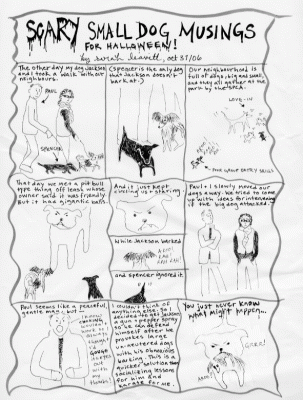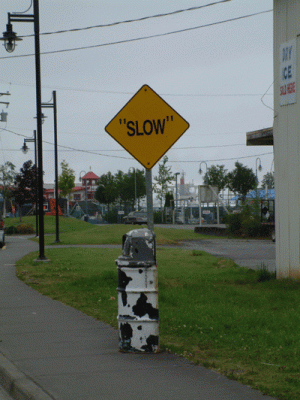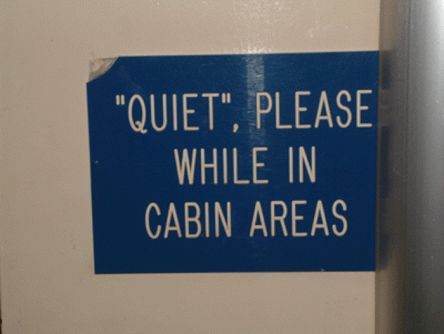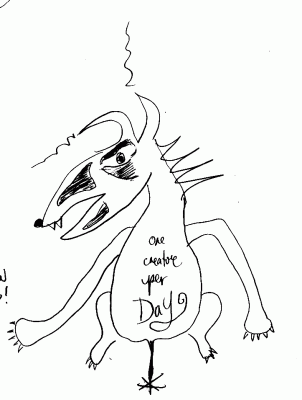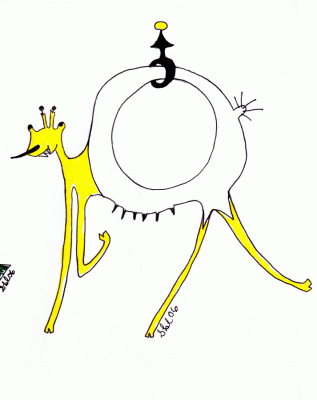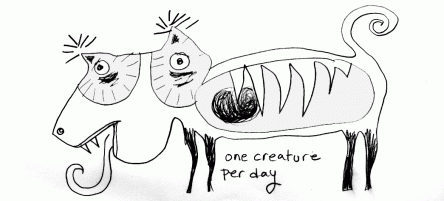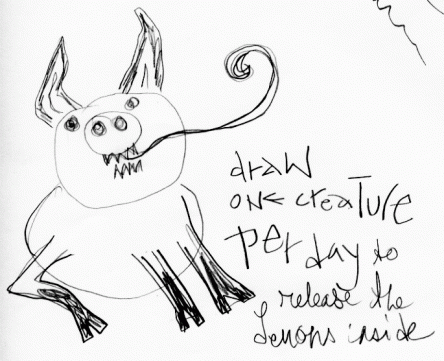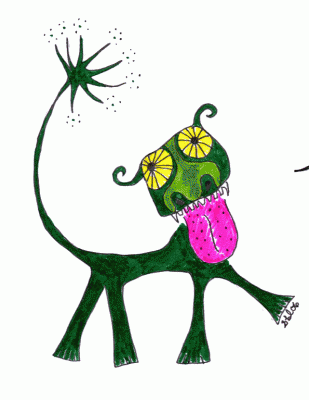Oops. This got a little crumpled when I was carrying it around in my bag today in between working on it.
News
Dykes and Small Dogs, Xtra West #344, October 26, 2006
I had always been an outspoken small dog hater, but in that moment everything changed. I fell in love with all small dogs and started to think of them as symbols of queer pride.
Read the whole column on the Xtra West website.
Grammar Tip #7: Avoid “excessive” and “inappropriate” use of “quotation marks”
Quotation marks can be used for a number of purposes. They can indicate dialogue, a word used as a word (see Tip #6), slang, epithets or nicknames, titles, or, my favourite, irony. Like so:
Amy said, “Please come with me to the coronation, dearest.”
Remember when “depilation” was a dirty word in our crowd of lesbian feminists?
Where I come from, we call notebooks “scribblers.” (See Geist Magazine’s Canadian Phrasebook for more sentences about Canadian slang.)
Many people know me as Sarah “the Pathetic Grammar Weirdo With Nothing Else to Do on the Weekend” Leavitt.
I have always loved “A Valediction: Forbidding Mourning” by John Donne.
Word is that Anchal on America’s Next Top Model is “fat.”
There are other uses, too. But all too often, quotation marks are misused. As on this sign I saw in Prince Rupert, BC last summer:
Here, quotation marks are used incorrectly for emphasis. But we read it as irony. So it’s as if the sign is saying we shouldn’t really drive slowly. Or the people who made the sign didn’t mean us to understand the common definition of “slow” but maybe some other meaning that only locals know.
Here is another example, from BC Ferries:
See what I mean? Do not use quotation marks willy-nilly. It makes people laugh at messages that are supposed to be taken seriously.
PS The quotation marks in the title of this post are excessive and inappropriate and undermine the serious nature of what I am trying to say.
Grammar Tip #6: Plurals and Apostrophes
I have a job marking students’ papers this fall, and one of the most common errors I see is the misuse of apostrophes in plurals. More often than not, students will insert unneccessary apostrophes. I imagine them saying to themselves, “Does this take an apostrophe? I’m not sure, because no one ever taught me. Oh well, I’ll throw one in. Better safe than sorry.”
In most cases, a simple “s” forms a plural. No apostrophe needed. So we write:
4 arms
27 cash registers
18 boys
5 trucks
(I am not sure what this adds up to, but the point is that there are no apostrophes.)
And, contrary to popular belief, we do not use an apostrophe in the plural forms of proper names. So the cute carved and painted wooden signs outside houses that say, “The Smith’s” or “The Cohen’s” are WRONG. Even if the signs were intended to indicate the possessive–i.e. “The Smiths’ House” or “The Cohens’ Cottage”–the apostrophe is still in the wrong place. But that is another topic.
These are the only rare cases where an apostrophe is required along with the “s”:
1. Words used as words:
When you are talking about a certain word, and put it in quotations, the plural is formed with an apostrophe. For example:
Sarah loves to use the word “wrong.” How many “wrong’s” do you think there are on this whole website?
OR
His letter to his lover was full of meaningless “I love you’s.”
If you use italics to indicate a word as a word, you just use a roman (non-italicized) “s” to form the plural:
i love yous
2. Abbreviations with more than one period:
Bob just has one B.A., but Shelly was in school for decades and ended up with two B.A.’s and an M.A. too.
Abbreviations with just one period, like “ed.” for “editor” just have an “s” added before the period, like so: “eds.”
3. Letters used as letters:
An example of a letter used as a letter would be:
The plural is usually formed by adding an “s.”
According to the Chicago Manual of Style, letters used as letters should be written in italics, and the plural is then formed by adding a roman “s.”
But when you use roman type or quotation marks, the plural is formed with an apostrophe, just as in #1 above. This is especially true if there would be confusion without the apostrophe. For example:
There are a lot of “I’s” in your story; it would read more smoothly if you took yourself out of it.
Without the apostrophe, “I” and “s” would spell “is.”
Nobody’s Mother
This anthology is coming out in November from Heritage House. It’s a collection of essays by women who do not have kids. I have kind of a bitchy piece in it. Click here for the invitation to the launch.
And Another Creature
Yellow and Black Friendly Creature
Pencil Creature
A Creature A Day
I had the worst day last Thursday. But thankfully I am visited by small bossy people that whisper words of wisdom to me at odd moments. I think they must be spirit guides from a past life. Like this guy…
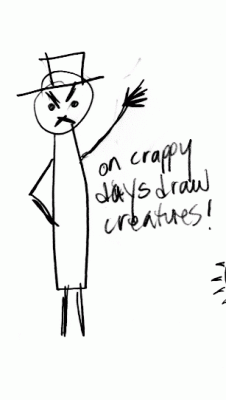
I listened to him and drew for a while and it helped me.
This will be my new technique for coping. I may need to write a book about it and put the anti-depressant makers out of business.
I did a colour one too a little later.
Grammar Tip #5: Some Words That Are Not Really Words At All
Just a short tip (and a late one) for this week:
Here are two words that people use that are not actually words at all. Please do send along more. What a fun rainy day activity!
Preventative and exploitive are not words. The real words are preventive and exploitative. How do we know? Because we say, “prevention,” not “preventation.” Similarly, we say “exploitative” because the noun form is “exploitation.”
